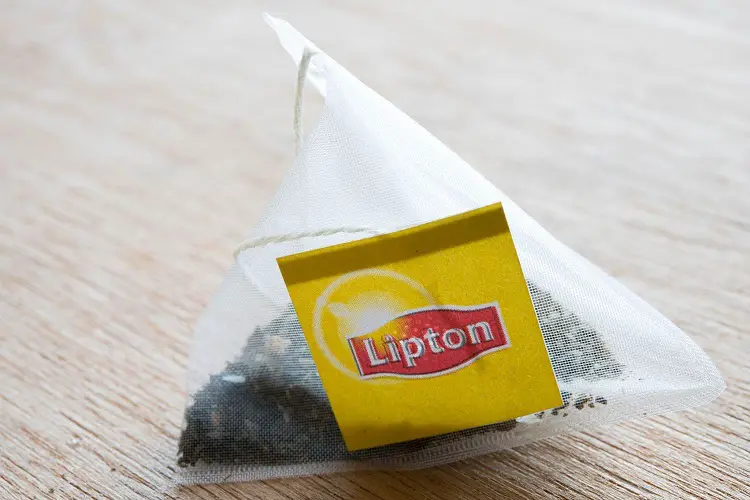Tea is a great drink, especially for people who want to avoid carbonated and sugary drinks.
Be it black, green, or iced, tea creates a soothing effect on the taste buds, and Lipton tea is a classic example.
It has a nice smell that leaves you feeling rejuvenated. But taking Lipton tea during pregnancy is a question many expectant mothers ask.
Even though taking Lipton tea during pregnancy is safe, you should pay attention to how much tea you consume during this period to avoid risking your health and that of the unborn child.
If you’re wondering how much is too much, we’ve covered everything you need to know about taking Lipton tea during pregnancy.
What is Lipton Tea?
Lipton tea is a unique blend of tea made from herbs. British Thomas Lipton developed it, a combination of several plants grown on different continents.
Many of us grew up in homes where parents and other adults drank this tea as part of their daily routine.
It has been on the market for over a century and is quite famous. It belongs to Unilever and is partly owned by Pepsi company.
Is Taking Lipton During Pregnancy Safe?

Taking Lipton tea during pregnancy is safe. Teas are preferable to sodas since they’re primarily organic and less sugary.
However, the amount of Lipton tea you take during pregnancy matters because it can inhibit a baby’s growth and lead to other birth complications.
Lipton is made from black tea containing high amounts of caffeine and is brewed for 3-5 minutes. The longer you brew black tea, the higher the caffeine in the drink.
Ordinarily, this would make a great drink. However, high amounts of caffeine in pregnant women cause blood vessels in the uterus and placenta to constrict, which inhibits blood flow and fetal growth.
Furthermore, caffeine can also directly affect the mother by causing anxiety, rapid heartbeat, jitters, and restlessness.
As an expectant mother, the last thing you need is any form of mental, psychological, or physical stress.
Excessive caffeine stresses out the blood vessels, which causes the heart to overwork, creating an unbalanced heartbeat.
Experts have warned pregnant women should not take over 200mg of caffeine daily.
To know how much caffeine you’re taking in a serving, here’s a list of the caffeine levels of different teas per 8oz:
·Black tea: 55mg
·Iced black tea (sweet): 40mg
·Decaf black tea: Less than 5mg
·Green tea: 28-38mg
Based on the amount of caffeine in each tea type, it’s safe to say that Decaf tea is the preferable option for pregnant women.
However, you can still manage the caffeine levels in your tea if it is not decaf tea. Since brewing the tea longer increases the caffeine level, brew your tea for less than 5 minutes.
You can also add milk to your tea to reduce the potency of the caffeine. The Food and Drug Administration (FDA) has recommended pasteurized milk for pregnant women.
Pasteurization kills all disease-causing bacteria that may be present in the milk.
Even though unpasteurized milk is healthy, there’s no guarantee that it won’t cause foodborne diseases like listeria.
Can Pregnant Women drink Lipton Iced Tea?
Based on the caffeine levels of all Lipton tea, Iced tea (green or black) has a moderate amount of caffeine. Therefore it is safe for pregnant women to take.
But it contains sugar, so if you’re watching your sugar intake, be mindful of how much Lipton iced tea you take in a day.
Lipton has created varieties of their iced tea drinks in different flavors like lemon, citrus, peach, and raspberry.
The strategy is great for people who enjoy flavored teas and want to have them on the go.
As enticing as these drinks are, their sugary and may have high caffeine content depending on the type of tea (green or black) used in making them.
Keep in mind that excessive sugar during pregnancy causes gestational diabetes and gestational hypertension.
Alternatively, a diet version of the iced tea replaces the sugar with an artificial sweetener called Aspartame, allegedly safe for pregnant women.
Can I Drink Lipton Green Tea During Pregnancy?
Lipton green tea contains only 28-38mg of caffeine in it. Compared to the recommended caffeine intake, the tea is safe for pregnant women if taken moderately.
Decaf tea has the least amount of caffeine in it. It is the safest tea for pregnant women.
But if you enjoy the others, be mindful of not exceeding the FDA caffeine recommendation for pregnant women.
As much as you may enjoy taking Lipton tea, your ultimate priority should be the well-being of your unborn child.
Since you may take other foods like hot chocolates or soda, including caffeine, be modest with your tea intake to avoid birth complications.
Does Lipton Cause Miscarriage?
The belief that Lipton tea causes miscarriage is one of the myths associated with pregnancy.
Considering the emotional rollercoaster pregnant women go through during this period, it’s understandable why many develop feats based on unfounded stories from random people.
The original Lipton tea is made from black tea. Other varieties are made from black, green, or iced tea. It doe not contain any herbs or roots that can cause miscarriage or inhibit fetal growth.
However, the amount of caffeine in black tea is much, and if brewed for a long, the caffeine level increases.
If you take Lipton yellow or black tea beyond the recommended caffeine level, you may risk birth complications such as poor brain development in the unborn baby.
Benefits of Taking Lipton Tea During Pregnancy
Beyond the soothing effect it gives, there are other benefits of taking Lipton tea in the right dosage during pregnancy. They include:
1. Boosts Your Immunity
Lipton tea aids in boosting your immunity while pregnant. The tea lowers the chances of viral infections and ailments. So you can enjoy a hot cup of Lipton tea while pregnant.
2. Offers Anti-inflammatory Properties
The anti-inflammatory properties of Lipton tea help treat several health problems, such as osteoporosis, rheumatoid arthritis, and other bone health issues. It can also treat pregnancy-related aches and pains (1).
3. It is Packed with Essential Antioxidants
Lipton tea is not a substitute for fruits and vegetables. It contains antioxidants such as flavonoids, which neutralize free radicals that cause cell damage and oxidative stress during pregnancy (2 ).
4. Enhances Cardiovascular Health
Lipton tea plays a huge role in cardiovascular health during pregnancy. The tea contains antioxidants like polyphenols which aid in preventing any heart-related disease.
Regular consumption of Lipton tea lowers the LDL cholesterol of expectant mothers with high blood lipids, preventing cardiovascular diseases caused by oxidative stress and inflammation.
5. Boost Memory
Women go through a lot during pregnancy, and memory loss and poor retention are among them.
The stress and fatigue that comes with the first and second trimester can be challenging for an expecting mom.
Several studies have shown that Lipton tea, made from green and black leaves, inhibits certain enzymes in the brain, leading to improved memory and retention.
Drinking one to two cups of tea daily can help improve your cognitive and retentive abilities.
6. Helps with Weight Management
The healthy nutrients in Lipton tea also help with weight management during pregnancy. Drinking tea, for example, herbal tea, helps you regulate your weight and prevents obesity while pregnant.
7. Cognitive Abilities
According to a study on the link between cognitive abilities and Lipton tea, cognitive abilities affect brain structure and reasoning patterns. This was found in a study conducted between 2015 and 2018.
The links in the region of the brain become more organized and effective for daily tasks.
In the long run, thinking capabilities are enhanced, making the individual make a better decisions. This is beneficial for you and your growing baby.
8. Blood Sugar Check
Many argue that Lipton tea does not correlate with blood sugar, but this is not entirely true.
Most teas contain polyphenols which are antioxidants. This serves primarily as an antioxidant but, by extension, helps regulates human blood’s sugar level.
9. Maintains Oral Health
Lipton tea helps you keep your dental cavity in good shape. The polyphenols reduce bacterial load in the mouth and neutralize acids that cause tooth decay.
Also, drinking it daily decreases the number of Sulphur compounds in your mouth, giving you nicer and fresher breath.
10. Lowers Risk Of a Heart Attack
A feature of Lipton tea is its ability to maintain cardiovascular health, and one of its functions is lowering the risk of a heart attack.
By relaxing and widening the blood vessels, a balance is created with more dilation than constriction, which lowers blood pressure, prevents strokes, and decreases obesity and atherosclerosis.
As a result of constant consumption, your body’s good cholesterol concentration increases, and health professionals suspect polyphenols to be the property responsible for this.
11. Keeps You Warm
Warm tea helps raise your body temperature, especially during a cold winter.
The cold can leave you feeling weak and tired when you wake up. A cup of Lipton tea will revive you for the day.
Some pregnant moms said Lipton tea helped them manage
nausea and other morning sickness troubles. Although this is subjective, you can give it a try.
12. Aids Bowel Movement
Most pregnant women experience constipation. It may be caused by lifestyle or diet changes, but it is unpleasant and difficult to deal with.
Do not hesitate to see your doctor if it persists for very long and it does not reduce even with tea consumption.
Lipton tea’s herbs possess properties that allow it to function as a laxative. It also softens the stool, making it easier to let it out.
13. Relaxation
Are you having trouble shaking off stress? Lipton tea can help. The aroma relaxes the nerves, and the ingredients relieve stress.
It also helps with other related problems like mood swings and helps with anxiety during pregnancy.
Read Also
- Jasmine Tea During Pregnancy – Is It Safe?
- How Much Caffeine is in Iced Tea vs Coke
- Can I Drink Red Label Tea During Pregnancy?
FAQs
Can I Drink Decaf Lipton Tea During Pregnancy?
Lipton’s website states that their decaf black tea bags are caffeine-free but may still contain some residual caffeine (Typically less than 5 grams).
Therefore, drinking decaf Lipton tea while pregnant can greatly lower your caffeine consumption during pregnancy.
Can Lipton Tea Boost Fertility?
Fertility is a delicate topic amongst women who’re looking to get pregnant.
While there may be beliefs that certain herbs or roots can either boost fertility or prevent pregnancy, no scientific research has proven any relationship between Lipton tea and fertility.
While it is advisable to avoid taking roots and herbs, especially during the early stages of pregnancy, always consult your health practitioner on sensitive topics like fertility and pregnancy.
Can Drinking Lipton Tea During Pregnancy Reduce Baby Weight in Womb?
Yes, Lipton tea can reduce baby weight or cause low birth weight if you take it in excess due to its high caffeine content during pregnancy.
Lipton’s caffeine is typically relatively safe for pregnancy as its caffeine content is less than 200mg, but when Lipton is taken in excess, it can cause weight reduction or low birth weight in babies.
Conclusion
Drinking Lipton tea during pregnancy is safe for both mother and child. However, the dosage matters since experts discourage excessive caffeine in pregnant women.
If you’re addicted to Lipton, other alternatives can give you the same soothing effect that Lipton gives.
